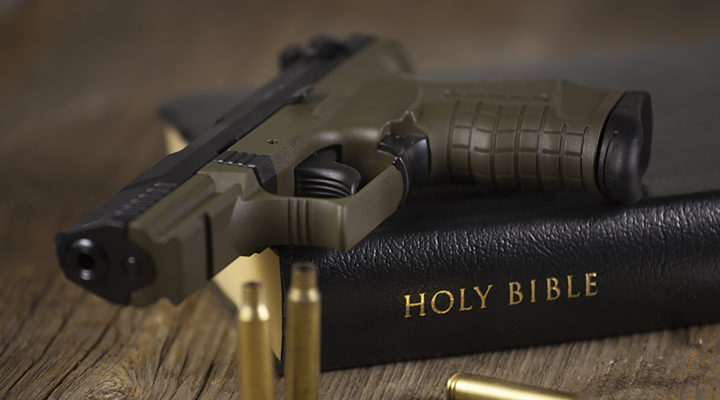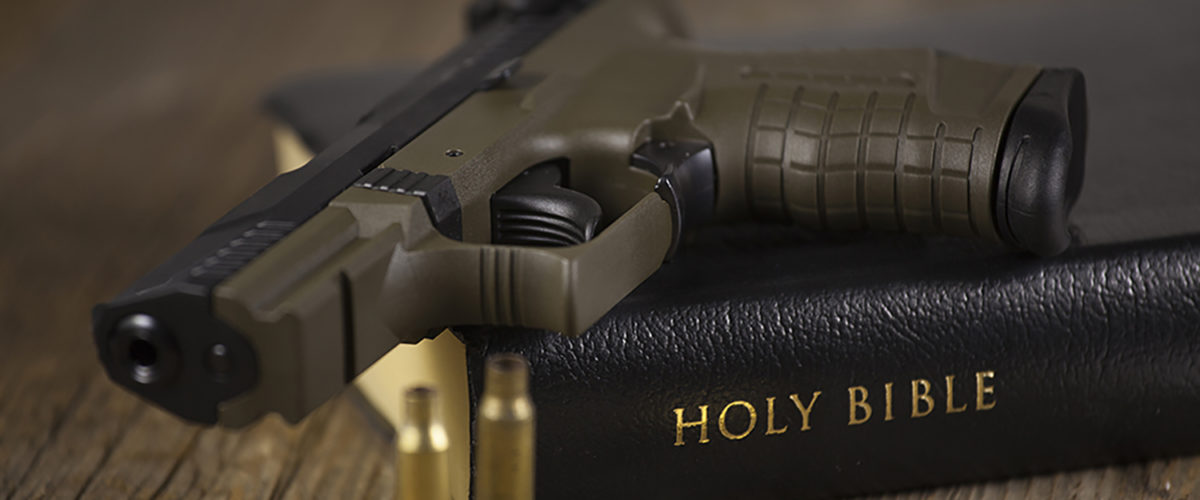Stop the madness.
So said organizers of the God and Guns 2016 conference. They are tired, they say, of wringing their hands, of changing their Sunday morning sermon after another Saturday night shooting, of gun advocates’ clichés and — worse — of expecting it to happen again soon.
If you don’t do something, “you are complicit,” organizers told participants who came from across the nation to Riverside Church in New York City Oct. 6-7.
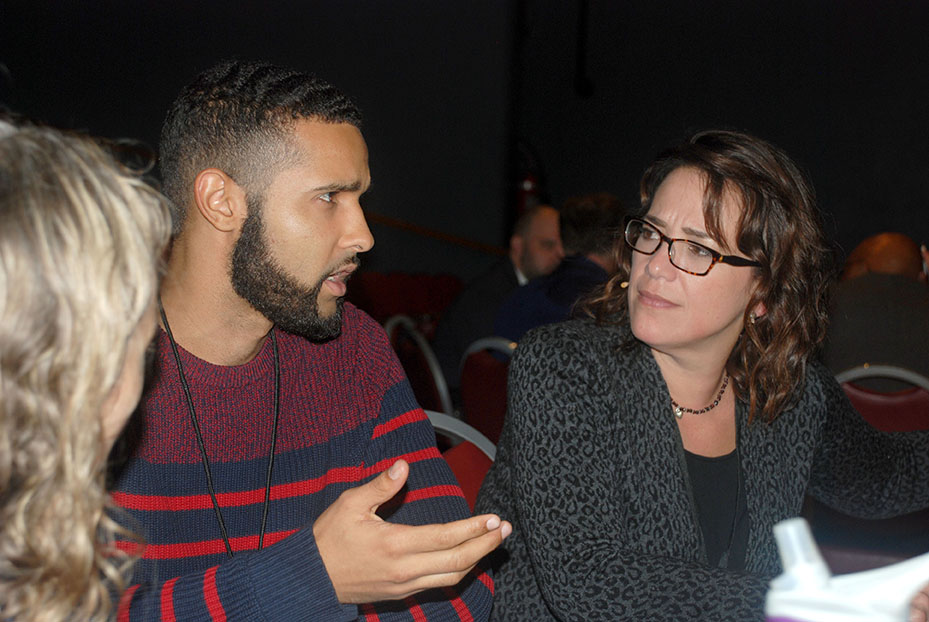
Amy Butler (right), senior minister of Riverside Church and conference catalyst, listens as participants share insights. (Photo/Norman Jameson/BNG)
According to Amy Butler, senior minister of Riverside Church and conference catalyst, those who do nothing are culpable in the 91 gun deaths every day in America, in ignoring the structural inequalities that lead to desperate acts, in denying the racism that fuels fear, and in trusting the false security of guns over trust in God.
Through survivor testimonies from Newtown to Ferguson, to political action plans, to providing tools for making sermons relevant to congregations reeling from the effects of gun violence, the conference was a “training” for ministers and other church leaders.
Organizers wanted to provide tools for them to start the conversation in their churches and communities that will lead to actions to lessen gun violence.
Riverside Church, jointly affiliated with American Baptists and the United Church of Christ, is a perfect location for such a conference, Butler said. It was built as America’s tallest cathedral in the midst of depression and social upheaval as testimony to the future.
Its pastors, like Harry Emerson Fosdick and William Sloan Coffin, advocated for social justice from the pulpit. Martin Luther King Jr. “stood right here and called out our country on issues of militarism, racism and social injustice,” Butler said.
“You are challenged to go from this place and do something. Anything. Preach a sermon, write a column, write your congressmen, talk to people in your circle.”
“Doing nothing means we are complicit.”
Tools for the tool kit
Interspersed with personal testimonies from people directly affected by gun deaths, organizers worked to educate participants about root causes for the social unrest that results in gun violence.
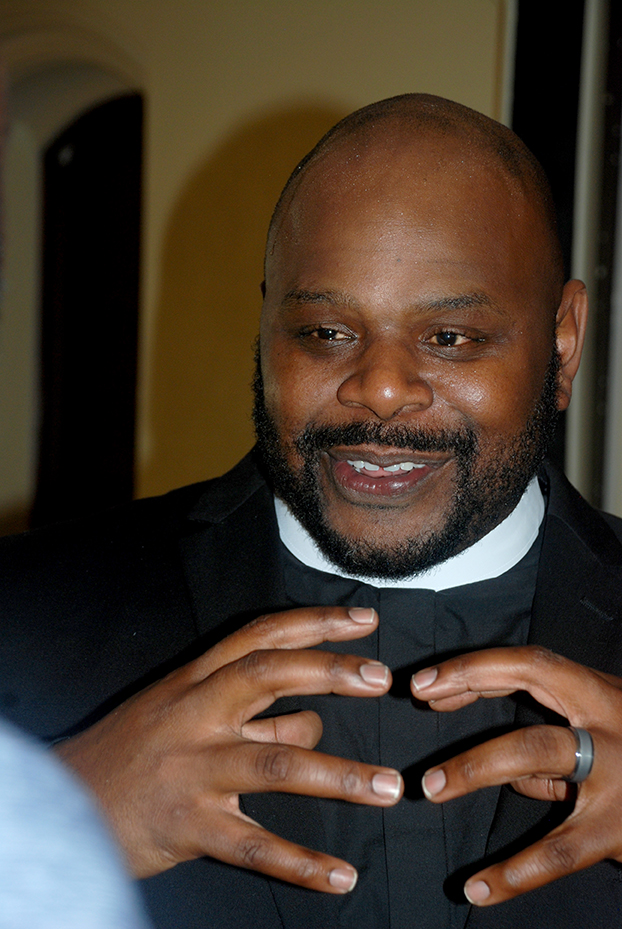
Ben McBride says he will ask protesters to stop looting, when others ask police to stop shooting unarmed blacks. (Photo/Norman Jameson/BNG)
The two biggest issues, they said, are fear and racial prejudice, neither of which should be a part of a Christian’s makeup.
When the “social narrative” is that persons “of a dark hue” are to be mistrusted and are categorized as “something less,” it is easy to label them as “monsters,” according to Ben McBride, regional director for clergy development for PICO in Oakland, Calif.
“And what do you do with monsters?” McBride asked. “You kill them, cage them, remove them.”
McBride, who spent 40 days standing by protesters in Ferguson, said, “I wish people would be more upset about the conditions that set the stage for violence than they are about the tools of violence or the person who holds the tool.”
Friends asked McBride if he urged protesters in Ferguson to stop looting. He said, “I’ll ask them to stop looting when you ask the police to stop shooting us.”
Persons of faith cannot ignore the “fear of the other” that prompts people to arm themselves and upon which gun merchants capitalize.
Conference leaders such as Alan Storey, who chairs Gun Free South Africa that seeks to limit gun access, said that fear promoted by gun advocates is a lie.
“If you are afraid because of all the guns on the street and you think the solution is to arm yourself, that’s just putting more guns on the street,” he said.
He calls those “gun violence denialists” who refuse to link the proliferation of guns and their easy access to gun violence. “They use clichés that are completely meaningless,” he said, such as “Guns don’t kill people. People kill people.”
“It’s people with guns that are able to kill far more people,” Storey said. “Their ideology says if we all have guns, we’re safer. We’re safe because we’ll be more polite. That is a lie. It denies gun violence.”
Talking directly to pastors, Storey said, “We’re called to love our congregations enough to tell them the hard truth. We have to love them enough to ask them to hand in their guns.”
The statistically verifiable truth is that “a gun in a home exacerbates the likelihood of gun violence,” he said.
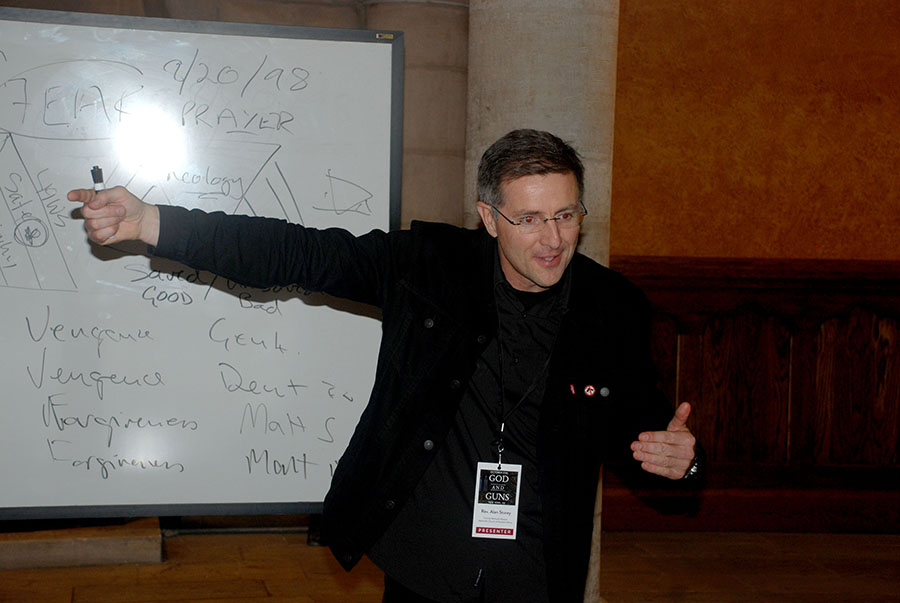
Alan Storey leads Gun Free South Africa and says gun advocates’ cliches are meaningless. (Photo/Norman Jameson/BNG)
Storey said that gun advocates use mental illness as a scapegoat 9 9 to turn attention away from the weapons. Mental illness is less a common denominator in violent incidents, he said, than is the fact that so many shooters are military veterans.
Everytown For Gun Safety
In 2006 U.S. mayors, tired of visiting gun violence victims in emergency rooms, started the group Mayors against Illegal Guns. After 26 died at Sandy Hook school in Newtown, Conn., a mother started the group Moms Demand Action for Gun Sense in America. These groups merged in 2014 into what is now a 3.5 million-member organization with chapters in 50 states called Everytown for Gun Safety.
The group is bipartisan and independent. Everytown works on legislation to strengthen gun laws and “fight the gun lobby agenda,” according to legislative liaison Liz Casey.
“We go toe to toe with gun lobbies when they introduce dangerous legislation,” Casey said.
Everytown wants to close loopholes that do not require background checks for guns purchased online or at gun shows, and to keep guns out of the hands of convicted domestic abusers and out of public spaces.
Background checks for potential gun purchasers — which take only a few minutes — have kept almost 3 million people in prohibited categories from buying a gun since 1998. But 40 percent of guns sold are in categories that do not require a background check.
Everytown attorney Andrew Karwoski said that when Missouri eliminated the background check system gun sales and deaths went up. States that institute background checks see gun deaths drop 48 percent.
He said there are more gun dealers in the United States than Starbucks, McDonalds and post offices combined.
Because this conference was to train advocates against gun violence, leaders constantly addressed the question, “What can I do?”
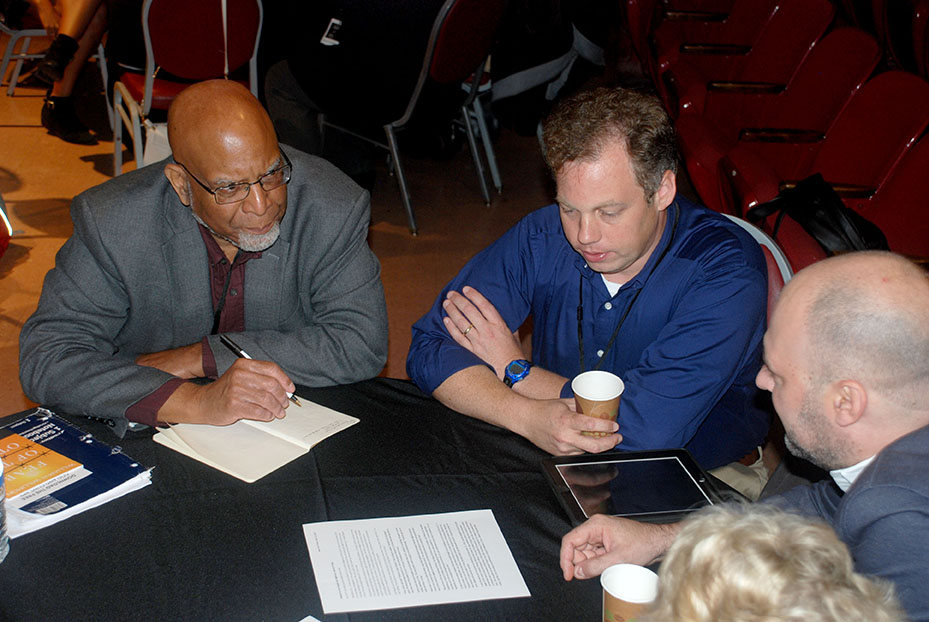
Through survivor testimonies, to political action plans, to providing tools for making sermons relevant to congregations reeling from the
effects of gun violence, the conference was a “training” for ministers and other church leaders. (Photo/Norman Jameson/BNG)
Casey suggested several steps:
• Organize a gun violence prevention event in your church;
• Join your local Moms Demand Action for Gun Sense chapter and invite a Moms representative to speak;
• Encourage your members to visit, call or write their state legislator when dangerous gun bills are up for a vote;
• Join the Everytown information network http://everytown.org/ to be notified when such legislation is being considered;
• Connect with other faith communities that are active in gun violence prevention.
Offering tools
Because the conference was about training, host pastor Butler, who also is a columnist for Baptist News Global, and Lisa Thompson, assistant professor of homiletics at Union Theological Seminary next door to the church, led a “tool kit” session on how to preach to a congregation hurting from the latest onslaught of gun violence.
A sermon prepared during the week has to make room for events on Saturday night, they said.
Riverside’s membership is majority black and Butler began her ministry there just after Michael Brown was killed in Ferguson. The compulsion to “do something” hit her hardest the Sunday after nine people were killed at Mother Emanuel AME Church in Charleston, S.C.
When she arrived at church that morning, Homeland Security was swarming the building. Officers asked the church to lock down their elevators, something that continues today.
Butler was a personal friend and colleague of Mother Emanuel Pastor Clem Pinckney, who was killed. Her congregation was full of outrage and fear and suddenly, hard realities moved from the headlines to her heart.
So, how do you adjust your sermon to address the news that is occupying congregant’s minds that morning, Thompson asked?
“If there was a recipe, we wouldn’t be at a conference.”
Ultimately, she told pastors, when they stand to speak, “You’re there to say something that matters for the sake of life.”
Butler said the key is to plan sermon writing around big pictures, such as, “How do we live in relationship to each other?”
“If someone comes in and kills 49 people you can make a connection that that is not how God wants us to live in relationship to each other,” she said.
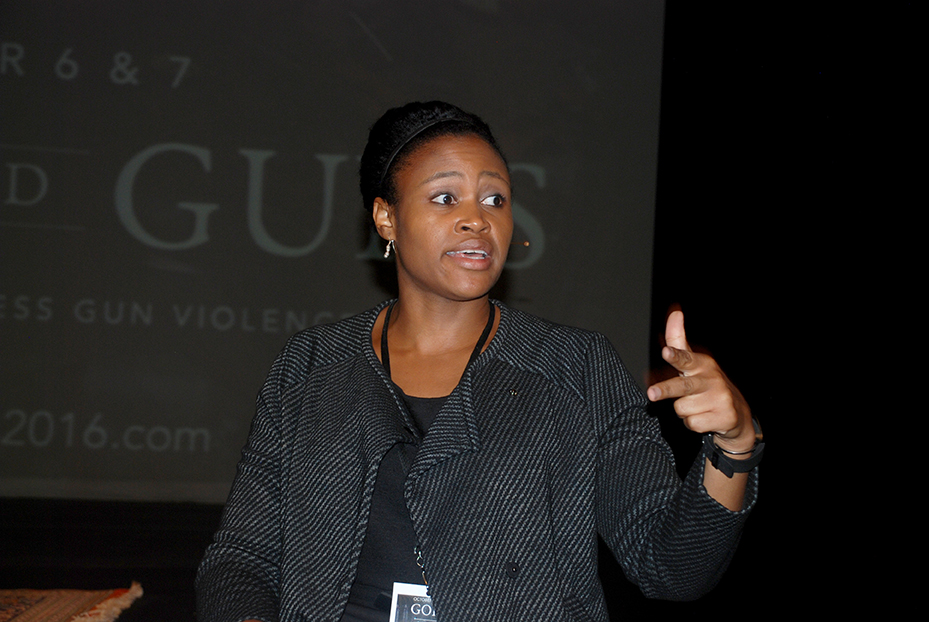
Lisa Thompson, assistant professor of homiletics at Union Theological Seminary. (Photo/Norman Jameson/BNG)
Other big picture issues include “Who are we with God? And calling out sin in the world. Or our choice to act either in fear, or in love.”
“If you have a sermon about choosing love over fear and a group of Amish girls is killed in cold blood and their parents forgive, you might be able to work that into your sermon the next day,” Butler said.
“You need to be preaching about these things all the time in your sermons. You can’t have people coming into your church the Sunday morning after Charleston and not mention it. You just can’t.”
Thompson suggested preachers ignore violence in our world because “we do not deal with the violence in our holy texts.” The Christian Bible is rife with extreme violence, from national and tribal wars to individual violence, such as Jephthah burning his daughter alive to fulfill a vow made in haste.
Butler had scheduled a sermon on the Good Samaritan. Then, the Saturday night before she was to deliver it, she learned that a grand jury declined to indict George Zimmerman for killing Trayvon Martin.
She stayed with the passage, but rewrote the ending by saying, “One day there was a man walking down the road. He was wearing a black hoodie and was on his way to buy some Skittles.”
And she walked away from the pulpit.
— This article was first published in the November/December 2016 issue of Herald, BNG’s magazine sent five times a year to donors to the Annual Fund. Bulk copies are also mailed to BNG’s Church Champion congregations.

